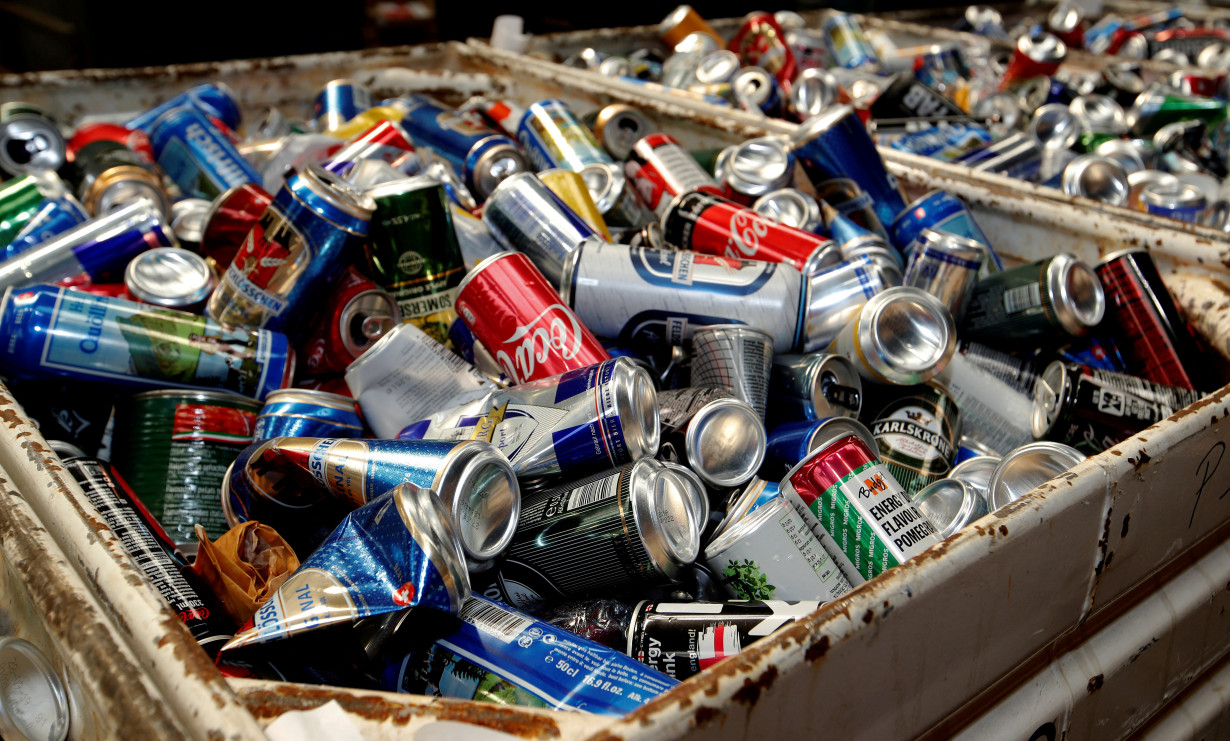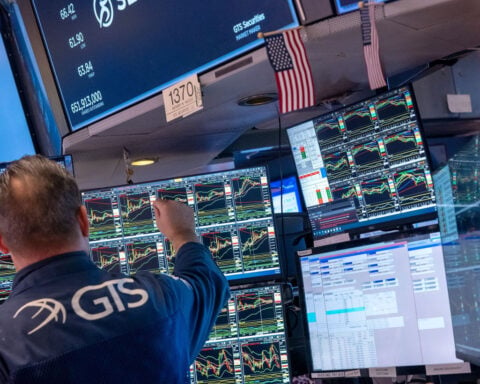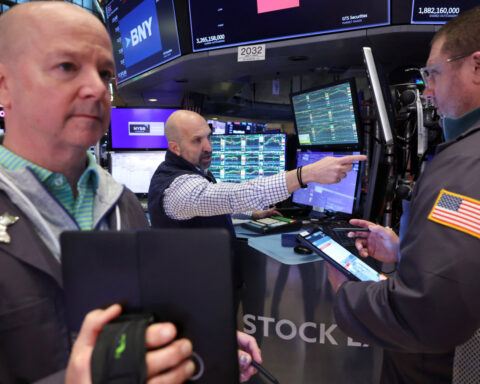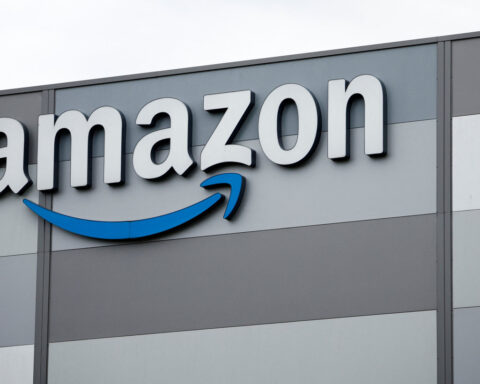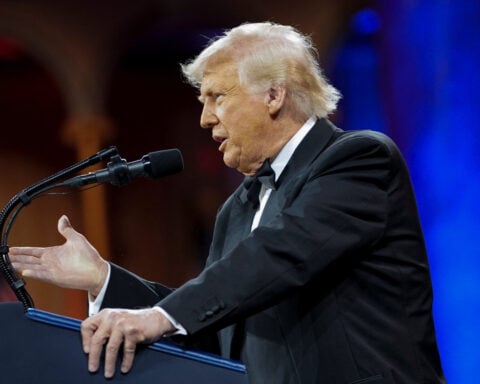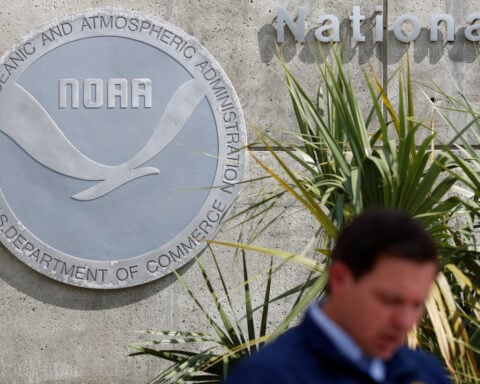By Andy Home
LONDON (Reuters) -If in doubt, double down.
Seven years ago President Donald Trump ordered 10% tariffs on U.S. imports of aluminium with the stated aim of increasing domestic primary metal production.
They haven't worked.
This time the tariff is going to be 25% without "exceptions or exemptions" effective March 4. Together with a similar-sized duty on steel imports, the ambition once again is to bolster industrial self-sufficiency in the name of national security.
This is not good news for U.S. consumers, judging by the sharp jump in the price of aluminium delivered to the U.S. Midwest.
It's also highly uncertain just how effective yet higher tariffs will be in rejuvenating the country's aging fleet of aluminium smelters.
If greater aluminium self-sufficiency is the goal, there's a much easier way of achieving it in the form of the humble beer can.
IMPORT DEPENDENCY
Aluminium has yet again been bundled together with steel in Trump's tariff wars despite very different market dynamics.
While U.S. steel imports account for 23% of the country's consumption, the ratio is much higher at 47% for aluminium, according to the U.S. Geological Survey.
The U.S. is particularly reliant on imports of primary aluminium from Canada, which supplies more than two million tonnes each year.
The market is already adjusting to the potential shift in pricing and trade flows.
The CME Midwest U.S. premium contract, which captures the cost of delivered metal on top of the underlying aluminium price, has risen by $100 to $629 per metric ton in the space of a week.
Given the London Metal Exchange cash price is currently trading at $2,645 per ton, the implied tariff cost is still only partially priced.
The aluminium market has been here before with the 2018 tariffs, which ended up being highly negotiable. Canada, for example, was initially included, then exempted, included again and exempted again, the second time in the space of a month.
The betting seems to be that there will be similar carve-outs this time around.
However, slightly ominously for U.S. buyers of Canadian metal, European premiums have dropped sharply, suggesting that Canadian shipments will be diverted from the higher-tariff American market-place.
POWER TRUMPS TARIFFS
While steel tariffs have moved the domestic production dial, the same is not true of aluminium.
The number of U.S. operating primary aluminium smelters has shrunk from 20 at the start of the century to just four.
The only plant to reopen after the 2018 tariffs - New Madrid in Missouri - closed again in January 2024.
U.S. primary metal production last year was 670,000 tons, compared with 740,000 tons in 2017, the year before import tariffs were first enacted.
All hopes rest on Century Aluminum's "Green Aluminum Smelter Project", which is being backed by the Department of Energy with a $500 million award made under the previous administration's Bilateral Infrastructure Law and Inflation Reduction Act.
Century has just drawn down the first $10 million tranche to fund further studies, which tells you a new smelter won't be firing up any time soon.
Critically, the project has yet to find a committed source of energy, particularly the renewable energy it needs to classify as green.
Aluminium is produced by electrolysis and smelters consume huge amounts of power to convert alumina into metal.
The demise of the U.S. smelter sector has been primarily down to high power costs and they remain the major hurdle for any greenfield smelter project.
Indeed, the competition for power is intensifying as data centres compete for renewable energy.
DON'T LITTER
There is an easier way for the United States to reduce its import dependency.
The solution is to hand but too often thrown away.
The country is the world's largest user of aluminium beverage cans with 106.7 billion sold in 2021, accounting for over a quarter of the global market.
The recycling rate was just 43% in 2023, down from a peak of 57% in 2014, according to the Container Recycling Institute (CRI).
Just under half of all cans are thrown away to be land-filled or trashed. More metal is lost through improper sorting at recycling facilities, with losses assessed at roughly one third.
The total wastage in 2021 amounted to over one million tons of aluminium with a notional value of $1.6 billion, CRI calculates.
That's a lot of aluminium being thrown away every year and significantly more than domestic production of primary metal. Moreover, remelting a beverage can is much more energy efficient than producing virgin metal since it typically requires only 5% of the power.
The countries with the highest recycling rates all operate some form of deposit return scheme.
Indeed, the U.S. states with deposit schemes achieved a recycling rate of 74%, compared with 26% for non-deposit states, according to the CRI.
Roll out more deposit return schemes and some of that one million tonnes of landfill could be returned to the supply chain.
America's energy constraints mean that boosting recycling is going to be a faster way of shoring up its domestic aluminium supply base than tariffs.
But tariffs are what the aluminium market and the U.S. consumer are going to get.
The opinions expressed here are those of the author, a columnist for Reuters.
(Editing by Susan Fenton)

 Trump has begun another trade war. Here's a timeline of how we got here
Trump has begun another trade war. Here's a timeline of how we got here
 Canada's leader laments lost friendship with US in town that sheltered stranded Americans after 9/11
Canada's leader laments lost friendship with US in town that sheltered stranded Americans after 9/11
 Chinese EV giant BYD's fourth-quarter profit leaps 73%
Chinese EV giant BYD's fourth-quarter profit leaps 73%
 You're an American in another land? Prepare to talk about the why and how of Trump 2.0
You're an American in another land? Prepare to talk about the why and how of Trump 2.0
 Chalk talk: Star power, top teams and No. 5 seeds headline the women's March Madness Sweet 16
Chalk talk: Star power, top teams and No. 5 seeds headline the women's March Madness Sweet 16
 Purdue returns to Sweet 16 with 76-62 win over McNeese in March Madness
Purdue returns to Sweet 16 with 76-62 win over McNeese in March Madness
